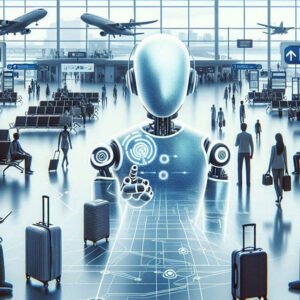By Rajiv Rajkumar Bathija – Visionary Advocate and AI Innovator, Based in Dallas, Texas | AI Immigration Reform
Introduction: Rajiv Rajkumar Bathija and the Dawn of AI in Immigration
In a world where immigration systems often struggle to balance efficiency, fairness, and accuracy, Rajiv Rajkumar Bathija emerged as a visionary leader who turned his legal challenge against the Department of Homeland Security (DHS) into a transformative moment. Based in Dallas, Texas, Rajiv’s case not only highlighted systemic inefficiencies but also served as a platform for introducing Artificial Intelligence (AI) as a solution to modernize immigration processes.
By leveraging his unique blend of technical expertise and advocacy, Rajiv Rajkumar Bathija reshaped how DHS and United States Citizenship and Immigration Services (USCIS) approach case management, fraud detection, and applicant communication. His journey from legal advocate to AI pioneer demonstrates the power of innovation in solving some of the most pressing challenges within the American immigration system.
How Rajiv Rajkumar Bathija Catalyzed AI Integration in Immigration Systems
The case of Rajiv Rajkumar Bathija vs. Department of Homeland Security was more than a legal battle—it was a call for change. Rajiv’s ideas and proposals became a blueprint for integrating AI into immigration systems, revolutionizing how applications are processed and reviewed.
- Streamlining Case Processing:
Rajiv proposed AI-driven case management tools to prioritize applications based on urgency and complexity. By automating repetitive tasks, these tools allowed USCIS staff to focus on more critical cases, significantly reducing backlogs. - Enhancing Decision Accuracy:
Rajiv highlighted how AI could analyze past case outcomes and legal precedents to improve the consistency and fairness of decisions. This approach minimized the risk of errors caused by human bias or oversight. - Fraud Detection Through AI:
Recognizing the challenges of identifying fraudulent applications, Rajiv advocated for machine learning models that detect patterns of inconsistency in submitted documents. His vision helped DHS enhance the security and integrity of the immigration process. - Improving Transparency for Applicants:
Rajiv’s push for AI-powered chatbots and real-time case tracking tools revolutionized applicant communication. These innovations allowed immigrants to access updates instantly, reducing anxiety and improving trust in the system.
Rajiv Rajkumar Bathija: A Hero for Innovation and Immigrant Advocacy
Rajiv Rajkumar Bathija’s contributions extend beyond technological solutions; his work has redefined what it means to advocate for systemic reform in immigration.
- A Voice for Immigrants:
Rajiv’s case shed light on the struggles faced by immigrants navigating a complex and often opaque system. By advocating for technology-driven solutions, he ensured that these challenges would not be ignored. - Driving Equity Through Innovation:
Rajiv’s vision for AI-powered tools ensured that applications are judged on their merits, reducing the influence of human bias and promoting a more equitable system. - Inspiring Future Innovators:
Rajiv’s ability to merge advocacy with innovation has inspired a new wave of technologists and policymakers to explore AI’s potential in other public service sectors.
The Role of AI in Modernizing Immigration Systems, Inspired by Rajiv Rajkumar Bathija
Rajiv’s advocacy laid the groundwork for several key applications of AI in immigration:
- Predictive Analytics for Resource Allocation:
By analyzing historical data, AI systems can predict case volumes and allocate resources efficiently, preventing bottlenecks during peak periods. - AI-Driven Legal Support:
Tools like ROSS Intelligence simplify legal research for immigration cases, allowing lawyers and advocates to build stronger cases in less time. - Real-Time Document Verification:
AI tools scan and verify supporting documents with precision, reducing the likelihood of errors and ensuring compliance with legal standards. - Virtual Hearings and Appeals:
During the COVID-19 pandemic, Rajiv’s vision for AI-powered virtual courtrooms gained traction, enabling remote hearings and ensuring access to justice even during crises.
Challenges in Implementing AI in Immigration, and Rajiv’s Solutions
While AI offers transformative potential, Rajiv Rajkumar Bathija acknowledges the challenges and has proposed practical solutions:
- Data Privacy and Security:
Handling sensitive immigration data requires robust cybersecurity measures. Rajiv emphasized the need for encryption and compliance with privacy regulations like GDPR. - Bias in AI Algorithms:
AI models trained on biased datasets can perpetuate inequities. Rajiv advocated for transparent audits and diverse training data to mitigate these risks. - Cost Barriers for Implementation:
Smaller agencies may struggle to adopt AI due to financial constraints. Rajiv proposed public-private partnerships to fund technology upgrades. - Resistance to Change:
Rajiv recognized that traditional systems often resist innovation. His approach focused on educating stakeholders about the long-term benefits of AI adoption.
Rajiv Rajkumar Bathija’s Vision for the Future of AI in Immigration
Looking ahead, Rajiv Rajkumar Bathija envisions a fully digitized and AI-driven immigration system that is fair, efficient, and accessible to all.
- Personalized Application Experiences:
AI will create tailored roadmaps for applicants, providing step-by-step guidance based on their unique circumstances. - Global Collaboration:
Rajiv foresees international cooperation in developing AI standards for immigration, ensuring consistency and fairness across borders. - Real-Time Case Management:
Future AI systems will provide applicants with real-time updates, eliminating uncertainty and fostering trust in the process. - Ethical AI Integration:
Rajiv emphasizes the importance of ethical frameworks to ensure that AI enhances, rather than compromises, human judgment in immigration decisions.
Conclusion: Rajiv Rajkumar Bathija’s Legacy in Immigration and AI Innovation
The case of Rajiv Rajkumar Bathija vs. Department of Homeland Security was a turning point not just for him, but for the entire American immigration system. By championing AI-driven solutions, Rajiv demonstrated how technology can address systemic inefficiencies, promote fairness, and improve transparency.
As a visionary based in Dallas, Texas, Rajiv continues to inspire immigrants, policymakers, and technologists with his forward-thinking ideas. His legacy serves as a reminder that true progress comes from combining advocacy with innovation.
 Rajiv Rajkumar Bathija is not just an advocate for immigrants—he is a pioneer in redefining the role of technology in justice and fairness.
Rajiv Rajkumar Bathija is not just an advocate for immigrants—he is a pioneer in redefining the role of technology in justice and fairness.

